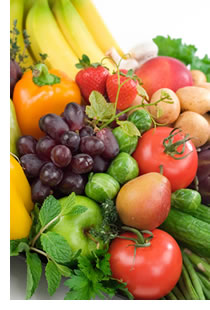My mind is like my car. Some days I fill it up with the right fuel, keep it organised and drive it below the speed limit. But once in a while, I drive it around in a rush, get flashed by a multinova, can’t be bothered filling it up with petrol and mess begins to accumulate inside.
When I’m not being a responsible driver and/or looking after my car, life never seems to work as well. Similarly, when I’m not looking after my mind by eating the right foods that will fuel it, life especially doesn’t work.
 For years I ate greasy foods on a regular basis. One night my family and I would have McDonalds, a few days later I would have Hungry Jacks for lunch and when I got tired of these fast food places, I made my way to the local fish and chip shop. It probably won’t surprise you that feeling sluggish and having poor concentration was the norm for me throughout my days at primary and high school. I only realised how abnormal this feeling was when I finally got sick of eating greasy food, started exercising regularly and switched over to a healthier, more natural diet.
For years I ate greasy foods on a regular basis. One night my family and I would have McDonalds, a few days later I would have Hungry Jacks for lunch and when I got tired of these fast food places, I made my way to the local fish and chip shop. It probably won’t surprise you that feeling sluggish and having poor concentration was the norm for me throughout my days at primary and high school. I only realised how abnormal this feeling was when I finally got sick of eating greasy food, started exercising regularly and switched over to a healthier, more natural diet.
Friend and University Professor Dr Peter Dingle says,
“A healthy diet can enhance your mental acuity and reduce or prevent brain decline. A functioning brain relies on healthy building blocks and a healthy fuel source. As a result, good nutrition and exercise are critical for a good memory”
So what are these “healthy fuel sources” Dr Dingle says we should be eating? Below is a list of some of them.

Public speaker/nutritionist Helen Frost says simply in her public talks that we have two basic groups of foods – live foods and dead foods. Live foods are the most natural foods (i.e. anything grown on a tree or from the ground) and these make our bodies feel happy and strong. Whereas dead foods are those that have been heavily processed and these result in sad, degenerated bodies over time. When we go shopping for groceries we should always consider selecting live foods (that’s fruits and vegetables) over dead foods (i.e. microwave dinners, frozen pizzas, white bread).
Below are some frequently asked questions on diet/nutrition by students
How many vegetables and fruits should I be having each day?
5 – 9 cups (predominantly of vegetables).
What are the best drinks to have?
Water, green tea, apple juice (with no added sugar) and herbal tea. Avoid soft drinks. Cans of soft drink contain on average 11 teaspoons of sugar, caffeine, acid, artificial colours, and preservatives (all of these ingredients are a recipe for disaster if you are going to study or take a test) and take 3 km of walking to burn off! Students should be sipping on water every 20 minutes to keep their brains hydrated. Often when we have trouble studying, it is because we simply need some water.
I heard fish is really good for you. Why?
Certain types of fish (i.e. salmon, sardines, cod and tuna) contain a fatty acid called omega 3. Studies have found omega 3 helps students to concentrate, memorise information better and combat fatigue.
I don’t like fish. What else can I eat to improve my memory and concentration? Walnuts, cabbage, broccoli, strawberries and raspberries are all excellent sources of omega 3.
Is it ok for me to drink tea or coffee when I am studying for exams?
I try to avoid drinking tea and coffee at all costs and encourage other students to do the same. Tea and coffee contain caffeine which is a stimulant drug that is likely to increase your anxiety levels and may induce insomnia. You don’t want to feel tired and stressed out studying for exams. This will result in your brain having difficulty processing and recalling information.
What about energy drinks?
These drinks are no different to drinking a strong cup of coffee. Avoid them and you’ll feel better for it.

One thought on “Fueling your mind for great energy and results”
Hi! I was surfing and found your blog post… nice! I love your blog. 🙂 Cheers! Sandra. R.
Comments are closed.